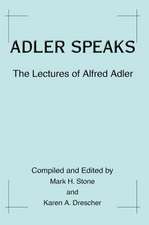Readings in the Theory of Individual Psychology
Editat de Steve Slavik, Jon Carlsonen Limba Engleză Hardback – 21 dec 2005
| Toate formatele și edițiile | Preț | Express |
|---|---|---|
| Paperback (1) | 302.95 lei 6-8 săpt. | |
| Taylor & Francis – 13 mai 2016 | 302.95 lei 6-8 săpt. | |
| Hardback (1) | 388.73 lei 6-8 săpt. | |
| Taylor & Francis – 21 dec 2005 | 388.73 lei 6-8 săpt. |
Preț: 388.73 lei
Preț vechi: 450.19 lei
-14% Nou
Puncte Express: 583
Preț estimativ în valută:
74.38€ • 77.67$ • 61.42£
74.38€ • 77.67$ • 61.42£
Carte tipărită la comandă
Livrare economică 16-30 aprilie
Preluare comenzi: 021 569.72.76
Specificații
ISBN-13: 9780415951685
ISBN-10: 0415951682
Pagini: 460
Ilustrații: 9 b/w images
Dimensiuni: 152 x 229 x 29 mm
Greutate: 0.75 kg
Ediția:1
Editura: Taylor & Francis
Colecția Routledge
Locul publicării:Oxford, United Kingdom
ISBN-10: 0415951682
Pagini: 460
Ilustrații: 9 b/w images
Dimensiuni: 152 x 229 x 29 mm
Greutate: 0.75 kg
Ediția:1
Editura: Taylor & Francis
Colecția Routledge
Locul publicării:Oxford, United Kingdom
Public țintă
Professional Practice & DevelopmentCuprins
Part I: Introduction. Slavik, Models, Theories and Research in Individual Psychology. Part II: General. Milliren, Clemmer, Introduction to Adlerian Psychology: Basic Principles and Methodology. Adler, Fundamentals of Individual Psychology. Dreikurs, An Introduction to Individual Psychology. Kopp, On Clarifying Basic Adlerian Concepts: A Response to Maddi. Griffith, Adler's Organ Jargon. Part III: The Creative Self. Stone, The Creative Self. Edgar, The Creative Self in Adlerian Psychology. Part IV: Social Interest. Huber, In Search of Social Interest. Bass, Curlette, Kern, McWilliams, Social Interest: A Meta-analysis of a Multidimensional Construct. Bickhard, Ford, Adler's Concept of Social Interest: A Critical Explication. Stasio, Capron, Social Interest as a Distinct Personality Construct: Comparisons with 'The Big Five' and Related Prosocial Constructs. Part V: Life Style. Peluso, Style of Life. Lombardi, Melchior, Murphy, Brinkerhoff, The Ubiquity of Life-style. Wheeler, Kern, Curlette, Life-style Can be Measured. Part VI: Children. Johansen, The Four Goals of Misbehavior: Clarification of Concepts and Suggestions for Future Research. Adler, How the Child Selects his Symptoms. Ansbacher, The Relationship of Dreikurs's Four Goals of Children's Disturbing Behavior to Adler's Social Interest-Activity Typology. Part VII: Encouragement. Carns, Carns, An Overview of the Current Status of Adlerian Encouragement. Carns, Carns, A Review of the Professional Literature Concerning the Consistency of the Definition and Application of Adlerian Encouragement. Part VIII: The Family Constellation. Manaster, Family Constellation: Meaning, Research and Future Research. Adler, Position in Family Constellation Influences Life-style. Campbell, White, Stewart, The Relationship of Psychological Birth Order to Actual Birth Order. Watkins Jr, Birth-order Research and Adler's Theory: A Critical Review. Part IX: Inferiority. Milliren, Clemmer, Wingett, Testerment, "The Movement From "Felt Minus" to "Perceived Plus": Understanding Adler's Concept of Inferiority. Dixon, Strano, The Measurement of Inferiority: A Review and Directions for Scale Development. Part X: Overcompensation. Hjertaas, Overcompensation in Adlerian Theory. Seidler, The Phenomenon of Overcompensation. Coleman, Croake, Organ Inferiority and Measured Overcompensation. Part XI: Phenomenological Approach. Shelley, Phenomenology and the Qualitative in Individual Psychology. Hanna, Community Feeling, Empathy, and Intersubjectivity: A Phenomenological Framework. Permissions.
Notă biografică
Steve Slavik has an MA (1991) from the Adler School of Professional Psychology Chicago and another in Hispanic studies from the University of Victoria (2004). Currently he works in private practice as an individual and marriage counselor in North Vancouver, BC and acts as a supervisor for MA-level counseling students. He has a number of publications in professional journals, is co-editor with Jon Carlson of Techniques in Adlerian Psychology, and is the editor of The Canadian Journal of Adlerian Psychology.
Jon Carlson, Psy.D., Ed.D., is Distinguished Professor of Psychology and Counseling at Governors State University, University Park, Illinois and a Psychologist with the Wellness Clinic in Lake Geneva, Wisconsin. He has served as Editor of both Individual Psychology and the International Journal of Individual Psychology. He has authored 35 books, 100 articles and produced over 200 vidoes/DVDs.
Jon Carlson, Psy.D., Ed.D., is Distinguished Professor of Psychology and Counseling at Governors State University, University Park, Illinois and a Psychologist with the Wellness Clinic in Lake Geneva, Wisconsin. He has served as Editor of both Individual Psychology and the International Journal of Individual Psychology. He has authored 35 books, 100 articles and produced over 200 vidoes/DVDs.
Recenzii
'[This volume] proposes a research agenda that is essential for both the revival and flourishing of Adlerian thought. A challenging call to action and vision of the future. Surely to be an invaluable resource for students, researchers and clinicians.' - Len Sperry, M.D., Ph.D., Florida Atlantic University, USA
'Something like this has been needed for a long time. Slavik and Carlson are trying to establish and define a group of constructs that can be more easily subject to validation and verification. The application of a scientific approach to the logic and constructs is long overdue.' - Bernard H. Shulman, M.D., Northwestern University School of Medicine, USA
'Something like this has been needed for a long time. Slavik and Carlson are trying to establish and define a group of constructs that can be more easily subject to validation and verification. The application of a scientific approach to the logic and constructs is long overdue.' - Bernard H. Shulman, M.D., Northwestern University School of Medicine, USA
Descriere
Readings in the Theory of Individual Psychology presents an overview of the central theoretical tenets and specific fundamental concepts of Individual Psychology, framed on terms that make it possible to verify empirically many of these theoretical foundations.

















